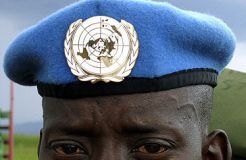Sudan renews its rejection of UN force to Darfur
May 15, 2006 (ADDIS ABABA) — Sudan renewed its opposition to the transfer of the African Union peacekeeping mission to the United Nations. It said that such takeover is not indicated in the signed deal with one rebel faction earlier in May.

The minister pointed out in his statement before the 51 Ministerial Meeting of the African Union Peace and Security Council, held in the Ethiopian capital of Addis Ababa that the presence of the African Union force was stipulated in the Darfur Peace Agreement (DPA) and that any talks of deployment of United Nations troops would mean replacing the African forces by UN forces as part of the security arrangements stipulated in the agreement.
Akol said all the parties which had been calling for a UN involvement had taken part in the talks in Abuja but that they did not bring in that question. He said the agreement itself did not mention any presence of UN presence in Darfur.
He said any new position with regards to transferring the mission to international force other than the African Union would need a direct dialogue and discussion between the United Nations and the Sudanese government in a separate procedure.
The pan-African body today urged Sudan to accept a UN force in the troubled western region, where three years of war between rebels and Khartoum backed by proxy militias have claimed some 300,000 lives and displaced 2.4 million.
UN chief Kofi Annan said he wanted the UN force to take over as soon as was possible now that a peace deal was in place.”This is not a moment for anyone to bask in congratulations,” he wrote in London’s Financial Times, saying the holdout rebels had to be persuaded to sign up.
The minister stressed that the agreement was an advance step towards the stability of in Darfur. He reaffirmed Sudan’s readiness to work in harmony with the African Union for the implementation of the agreement.
He underlined that the Sudanese government had some reservations about the agreement but it still signed the document and that these reservations did not contradict with the government commitment to implement the deal.
The minister revealed that the Sudanese president Omar al-Bashir, has formed a committee to draw up plans for the mechanisms to implement the accord in all transparency.
The minister expressed hope that the African Union and behind it the international community would exercise pressure on the remaining groups that did not sign the agreement to do so in order to allow moving forward to a new phase in the region.
He said the government also hoped to see the international community playing its role in providing all types of material, logistic and humanitarian assistance.
The minister expressed appreciation for the position taken by the Netherlands with the view to convene a donors’ conference for securing assistance for Darfur.
The minister called on the international partners and on the peaceful powers in the world to boost the future of the peace process in Darfur. The minister explained the efforts exerted by the Government of National Unity to improve the humanitarian situation in the region such as the decision to facilitate the flow of humanitarian assistance.
On the position towards Chad the minister said it was Chad that severed diplomatic relations with Sudan and distanced itself from guaranteeing the safety and security of any Sudanese national to the extend that the Sudanese diplomatic mission in N’djamena was attacked but that Sudan had exercised self restraint towards all these attacks. He said Sudan was committed to the Tripoli Agreement.
The minister said he expected the Abuja peace agreement to reflect positively on the stability in the relations between the Sudanese Chadian Relations.
In a press statement to the official SUNA, Akol said the meeting has also stressed that “the few” who did not sign the DPA should not be allowed to obstruct what has been achieved up to now and that they should not work to obstruct the agreement least they would be facing the UN and the international community which have backed and welcomed the agreement.
The minister said he expected the American and European sides to be moderate in their stands towards the Sudan following the conclusion of the agreement and putting an end to the war and the commitment to implement the clauses of the agreement under the supervision of the African Union, the United Nations and the mediators.
(ST)
